- Home
- Mark Zubro
Safe Page 3
Safe Read online
Page 3
I thought Steve might be listening, but he didn’t meet my eyes when I looked up at him.
I said, “I’m trying to think of where to go to ask more questions. I want to get some positive facts. I can’t ask every kid in all his classes. I think I’d get pretty much the same information I got from the ones I talked to already. None of them said he had any friends at all.”
Darlene thought for a minute then said, “That hamster thing rings a bell.”
“Were you in grade school with Kyle and Frank Boyer?”
“No, that’s not it.” She thought a few more seconds. I mentioned already that Darlene is brilliant. She remembers everything including all the obscure grammar rules that we break while writing our stories.
A few seconds later she reached back and pulled out a bottom file drawer. She rummaged through old drives, disks, and tangles of wires.
“It’s in here somewhere,” she said.
“What?” I asked.
She came up with a flash drive. “I think there was some article that mentioned animals and Kyle. I wasn’t on the paper then. I can’t remember the exact issue, but it stuck in my mind because even then Kyle had his reputation, and I thought the article showed there might be more to him. I bet if you hunt through this, you’ll find it. This has the issues from our freshman year on it.”
“You memorized all these?” I asked.
“No, I vaguely recall it from when I read it the first time. I’m pretty sure it was freshman year.”
I gave the flash drive a glum look. I know research is important to reporters, but sometimes it is really tedious and time-consuming.
“It’s a place to start,” she said.
“Yeah.”
“Also, think about going to the place where he committed suicide.”
“I have thought about it.” It wasn’t just morbid curiosity, although it was a little bit, but now I wanted to know, to find out all I could about Kyle. Maybe the place itself would give me some insight into him.
“And,” Darlene added, “you might want to talk to Frank Boyer. If he tormented Kyle so much, he might have something interesting to say.”
I couldn’t imagine he would, but I didn’t cross it off my list. Darlene can be pretty perceptive, as well as smart, but trying to talk to Boyer sounded a little dangerous.
She leaned in close to me and said, “You know what’s really sad about Kyle?”
I shook my head.
“You know those grief counselors that Ian mentioned this morning?”
I nodded.
“Nobody, not one kid or teacher, went to talk to them. Not one person cares that he’s dead. That’s really sad.”
And it was. I wondered if I had known him, if I could have been his friend, or if I’d taken the time, if it would have made any difference in his life.
I grabbed the last free computer and inserted the flash drive in the USB port. I had to call up each issue separately before I could put Kyle’s name into the search line.
As I started on the second issue, Ian plopped his butt on the corner of the desk nearest to me. This afternoon he was depressed-world-weary Ian. He unwrapped a candy bar, took a gargantuan bite, chewed a minute, then said, “Heard you were working on a story about Kyle Davis.”
“Not a secret.” I found nothing on the search in the second issue so I started on the third. At least it wasn’t tediously looking through issue after issue on hardcopy.
“Poor kid was gay,” Ian said. “I don’t understand the type. My girlfriend and I…”
I tuned Ian out. He’d talked about his many girlfriends, often implying how sexually active he was, and maybe Ian was simply an effeminate heterosexual. I didn’t know and wasn’t interested enough to find out. I unobtrusively inched away from him, closer to the end of the table I was working at. I figured this might keep his roving eyes off the crotch of my pants. I hoped I was never that obvious about my interest in anybody or anything. Straight he might be, but did straight guys have “fly eyes”? Not that I knew of. Ian finished his snack and waddled back to his own work.
I got through twenty issues pretty quick, but I was beginning to fear that Kyle’s name hadn’t been indexed. Either Darlene had misremembered, or maybe I’d have to go back to each issue and every single article to see if it was about animals. That didn’t sound like a lot of fun to me.
I took a break to make a few calls. I left a message on the machine at home, telling them that I’d be late. My parents wouldn’t be surprised. On Mondays the newspaper often kept me until after six. I called the police. I didn’t get past the switchboard person. The woman who answered became suspicious real quick and asked what my interest was. I told her about writing the article. She didn’t sound like she believed me, then demanded my name, and wouldn’t give me any information. I gave up on that. I found a copy of the Riverside paper online, but it didn’t give any particulars beyond Kyle’s age and where they found him. I tried calling the newspaper. They said the reporter on the story wasn’t around. I could call back tomorrow. Before I got back to work, Steve called me over. He had the edits on my column. A lot of the time, he didn’t look you in the eye, just spoke in this soft, almost whisper, like he didn’t want to offend you when finding your mistakes.
Mr. Trumble insisted we work with copy editors and editors on our pieces. He said it gave us good training for the real world. Steve had done a good job and found mistakes which, if they’d gone out under my byline, would have been embarrassing. I thanked him, and he mumbled, “You’re welcome.”
Ian was next for Steve. It was a good thing Mr. Trumble was there. Ian could be a real asshole about his copy although he was one of the worst typers and spellers and somehow managed not to use spell-check, which was kind of stupid. If Mr. Trumble was in the room, Ian would be less abusive. I think Steve had figured that out long ago.
I uncovered the connection with Kyle and animals in the twenty-fifth issue of the paper of our freshman year. We put out thirty-six a year. It was in an article about misusing pets for experiments for cosmetics. The article quoted Kyle about how to care for rabbits that had been abused.
I called Darlene over and showed her the computer screen. Neither of us knew the kid who wrote the article. We asked Mr. Trumble. He didn’t remember the article, and the kid who wrote it had graduated and gone to college someplace back east. He didn’t know where.
I said to Darlene, “I can’t believe you remembered this from one little article.”
She sniffed. “I’m a member of PETA. This article was my inspiration to get involved.”
“But Kyle’s a small part of it.”
She shrugged. “Took me a while to think of it.”
Mr. Trumble called the former student’s parents, who gave him the name of her school, which I called, and got hold of her in her dorm room.
She barely remembered the article or Kyle. She thought maybe she got his name and might have talked to Kyle at a pet store, animal hospital, or veterinarians’ office. She couldn’t remember enough to be more specific, but she said, “It had to be one of those three since I know that’s where I got my quotes.”
While I talked to her, I Googled pet stores, animal hospitals, and veterinarian offices in Riverside. I asked her if any of them rang a bell. I printed a list and checked off the names of the ones she thought she’d talked to. I’d try them tomorrow.
CHAPTER SIX
Monday 4:58 P.M.
I double checked on the Riverside newspaper’s Internet site and confirmed the general location where Kyle had been found. I decided to drive over. I got in my car, which has the great virtues a teenager values in their most prized possession. It has four wheels, it runs, and it has this great stereo system. I keep the car tuned up so the engine purrs like a dream. It could idle for hours, and you’d barely hear a murmur from it.
I perform a ritual every time I get in the car. First, I make sure the sound is off on the stereo system. Then I pick out the song on my iPod that I want, make sure
the adapter is plugged in, then turn the music on. This way the music exactly matches my mood.
I keyed in a Danny Schmidt compilation I’d made and cranked up the volume about halfway.
The orange groves around Riverside used to be super extensive. At the corner of Arlington and Magnolia they still have the parent navel orange tree from back in the nineteenth century. Even with all the development over the decades, they’ve still got plenty of citrus trees around. I took the Riverside Freeway to Van Buren, exited, and drove northeast half a block to Indiana Avenue, then about a mile to Jackson and cruised out to the scene. At Victoria Avenue I slowed.
Victoria Avenue is this beautiful street. It’s one lane in each direction with a wide parkway between them. Ragged robin rose bushes line the edge of the middle strip, which also contains fantastic old shade trees—pepper, eucalyptus, and magnolia. The same kinds of trees line the sides of the road. The whole street is like from a time before industrialization, with the orange groves peeking out from behind the roadside foliage. A few houses have gotten squeezed in just off the road.
I continued on Jackson for several more miles. The sun had almost set, and I wasn’t sure what I’d be able to see. Gloom had gathered under the lines of orange trees and begun to spread outward.
Few cars disturbed the peacefulness of the groves. I turned off the iPod and listened to the night gathering around.
I came to where my phone’s GPS said I was near the spot. I inched the car forward. Trees lined Jackson even this far out and in a few places I could see clumps of taller trees off the road among the orange trees. I didn’t know if those taller trees were around people’s houses or what.
I slowed to just above idle speed. A quarter mile from the end of Jackson, a dirt road led off to the north, and I could see a cluster of pepper trees in the distance.
I pulled the car in. If it was somebody’s driveway, I could just turn around. The lane seemed to extend on for quite a way, and I couldn’t see a house. Maybe twenty feet in on the right side, I caught a glimpse of yellow.
I eased my car closer to the spot. What I thought might be police tape around a crime scene was just that.
I nosed the car off the road a few feet and shut it off. The metallic clicks of the cooling engine slowly died. The enveloping silence seemed to add to the dark shadows. Then I began to note the early evening noises. I heard an owl, crickets, the rustle of leaves, and the muffled whine of a distant motorcycle.
What would Kyle have been thinking of when he stood out here that evening? Did he listen for footsteps? Did he cry for himself? Did he try to change his mind at the last second? What were those last instants of desperation like?
I got out of the car and edged over to the police tape. It made an enclosure about ten feet square. The barrier wouldn’t have kept out a demented mole. I slipped under the tape and stood near one of the pepper trees to which the police had attached it.
A gust of wind rustled all the leaves on the trees. My skin felt chilled. I should have worn my jacket, and I probably shouldn’t have come so late. It was too dark to see much. I touched the bark of the tree.
I saw a light begin to shine through the trees to the east. I thought it might be from a house. I gazed at it for a few moments and then realized it was an orange moon rising.
I don’t know how long I stood and watched the moon’s glow spread over the serene and muted landscape. For some reason it made me sad. Maybe because standing in this spot, I felt Kyle’s death so close. Maybe because I’m like a lot of gay teens, and I’ve thought about death too.
I swiveled my head to take a last look at the peaceful scene. I noticed moonlight glinting off something about twenty feet away. I stared intently until I made out the full shape of what it was.
Farther off the road than I’d placed mine, moonlight reflected off a car windshield. Up to now the car had been hidden from sight by a row of bougainvillea bushes.
The leaves on several of the orange trees about thirty feet to my right shook. I heard soft footsteps. The ground in the orange groves is mostly ruts of dirt, maybe a couple inches deep so the water from the irrigation ditches can flow around the trees.
Was this the person from the other car returning? I hadn’t hidden my car. Whoever it was would be able to see it clearly. Maybe it was the owner of the land, and I was trespassing. As the footsteps came nearer, I began to hear muttered curses.
A form emerged from the darkness between the two nearest orange trees. Silhouetted against the moonlight was the figure of a male. I could see that he was at least a foot taller than me, and he carried a flashlight, which he kept banging against his left hand. He continued to swear at it. He looked up and saw my car.
“Who else is here?” he asked. His voice was soft and quiet.
I emerged from my place by the tree. He didn’t get startled or jump. I told him my first name.
He repeated my name and added, “You come here for a reason? Maybe curious about death and dying?” His voice was gravelly, maybe from smoking too many cigarettes, or too much booze, or he was real old.
“I’m writing an article about Kyle for the school newspaper.” I wished I sounded cool and confident. Instead my voice squeaked like it hadn’t since freshman year.
“Ever see death up close?” he asked.
I remained silent. His feet shuffled through the dirt toward me. He stopped three feet away. “Death isn’t pretty like in funeral homes. I’ve seen it in three wars, big wars, not these two-bit things the politicians dream up to show how macho they are. You’re talking to a guy one second, and the next instant he has no head. They never find the bone and brains because it’s a little bit of mist floating over the countryside.”
I thought a couple things at this point. One, I wanted to get away quick. Two, this close, the guy seemed a lot older than I thought, and three he was probably nuts.
I began edging away.
“You don’t need to run,” he said. His voice sounded amused. “I’m a reporter. Bill Singleton from the Riverside Tribune.”
I felt my apprehension ease a little. Everybody in town knew his name. Years ago he’d been one of the most famous reporters in the country. He’d won two Pulitzer Prizes. He received one when he uncovered a big scandal in Sacramento. The governor had tried to intimidate and then bribe him. The courts had threatened to throw him in jail if he wouldn’t reveal his sources. The governor escaped with his career, but a bunch of other politicians went to jail.
The second Pulitzer Singleton won because he had also uncovered a lot of dirt about various Riverside County politicians throughout the years, including cops high up in the department. A lot of people in town hated him, but a whole lot more thought he was a hero. I hadn’t noticed his byline so much in the last few years, but he was looked up to by every kid who wanted to be an investigative reporter.
He strolled over to my car and rested his rear on the side.
His next question threw me. “Did you kill him?” Singleton asked.
“Huh?” I asked. I paused for a few seconds. “They told us at school he committed suicide. That’s what was on the Internet.”
“That’s what they told me too,” he said. “I’m not sure I believe it. That’s why I asked you. It’s always good to ask the obvious questions.”
“I didn’t kill him,” I said. “I didn’t even know him. Why do you think it might not have been suicide?”
“An old reporter’s twitch,” he said. “Or maybe they’ve been dumping these nothing assignments on me since I refused to retire three years ago, and I want something exciting to happen. Maybe a son of mine died this way forty-three years ago, and I still don’t understand it.”
He didn’t say anything for a while. I felt bad for him so I said, “I’m sorry your son died.”
He banged his flashlight against his palm a few more times. Once he got a feeble glow, but it quickly winked out. He cursed a minute then said, “Come here.”
I inched closer to him.
> “Look at this.”
He held something out to me in his right hand. When I hesitated, he growled, “I’m not going to bite. You can outrun me by about a million miles an hour.”
After I got close enough, he dropped the thing into my hand. I examined it in the moonlight. It was the smallest stuffed animal I’d ever seen, a miniature Eeyore, the sad donkey from Winnie the Pooh.
“I don’t get it.” I handed it back to him.
“Might not mean anything,” he said, “but it’s something out of place. I discovered it about an hour ago, as the sun was beginning to fade. I found it about thirty yards from here on a path leading to the irrigation canal.”
“It could be anybody’s.”
“Found a lot of strange footprints and markings around the spot that didn’t make sense to me. They haven’t run water through this part of the grove lately so everything was pretty clear.”
“Why didn’t the cops find it?” I asked.
“No need to hunt much if it’s a suicide. I came out here to look, same as you. Got nostalgic for the times I used to ride my bike through the groves. Back then, you could ride forever and just see orange trees. When I got here, I took a walk. Saw something odd, near something unusual. I followed six sets of prints from the spot I found the stuffed animal back toward this spot. Could be connected. Maybe not. I want to come back in full daylight because there’s a couple other things. The cops didn’t find a car, or any kind of transportation near where they found the body. Just a step stool, a rope, and the body. And no note. Some suicides don’t leave notes, but Kyle Davis would have had to carry that step stool all this way.”
“How big was it?” I asked.
“Not very,” he admitted, “but it would have been an awkward thing to lug out here, and he had a lot of choices before getting to this tree. Why here? He lived miles away.”
“Maybe this was his favorite spot.”
“Or maybe somebody killed him here and wanted to make it look like suicide. I’d like to know where he got the step stool and the rope. The police haven’t released a report. It could be important to know where he got the materials, but they don’t cooperate with me since I unearthed a scandal in the department.”

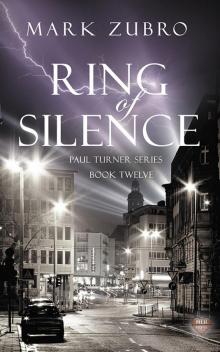 Ring of Silence
Ring of Silence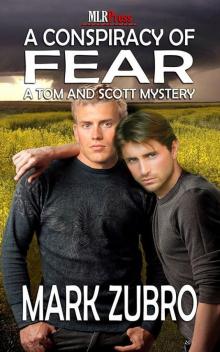 A Conspiracy of Fear
A Conspiracy of Fear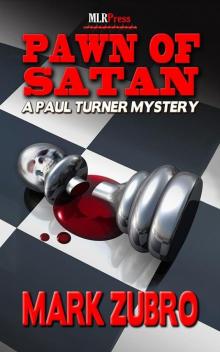 Pawn of Satan
Pawn of Satan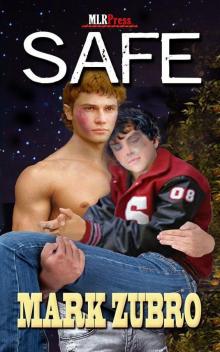 Safe
Safe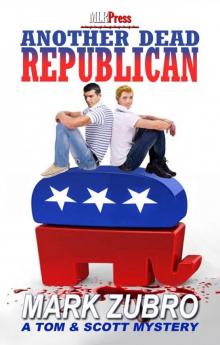 Another Dead Republican
Another Dead Republican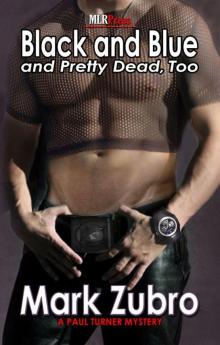 Black and Blue and Pretty Dead, Too
Black and Blue and Pretty Dead, Too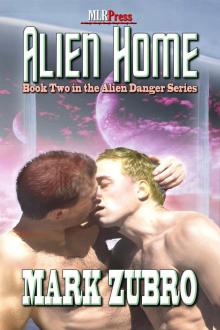 Alien Home
Alien Home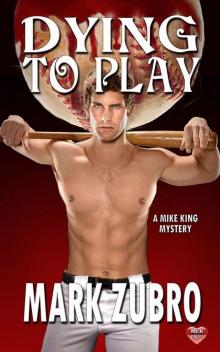 Dying to Play
Dying to Play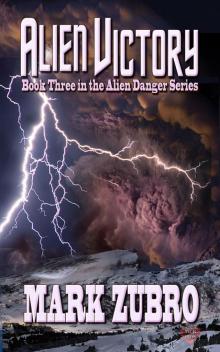 Alien Victory
Alien Victory